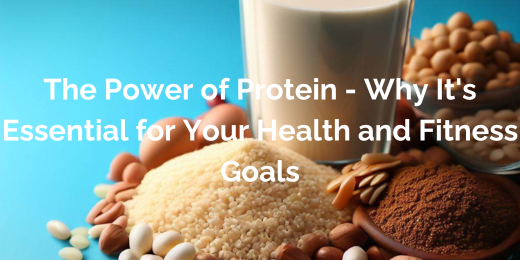Benefits of Protein
A healthy diet and regular exercise are vital for overall well-being. However, Protein stands out as a nutrient essential for fitness and wellness. Proteins enable the formation and repair of tissues, the maintenance of a healthy immune system, and the promotion of bone health.
Protein is essential to every workout routine because it aids in endurance, stamina, muscular building, and recuperation. In this blog post, we’ll go through the benefits of Protein and why they’re so vital for achieving your fitness and health goals. Knowing the importance of Protein will help you make better decisions about your food and exercise routine.
What is Protein?
Proteins are essential macromolecules for the efficient operation of the human body. They comprise amino acids, which are the fundamental building blocks of life. Proteins are required for various biological tasks, including tissue formation and repair, molecular transportation, and hormone and enzyme control.
Complete proteins and Incomplete proteins are the two types of proteins. Incomplete proteins are missing one or more necessary amino acids that the body cannot synthesise on its own. In contrast, complete proteins have all the indispensable amino acids that the body cannot engineer on its own. Complete proteins are found in animal-based sources such as meat, fish, and dairy, but plant-based sources such as beans, grains, and nuts are often incomplete proteins.
Understanding the various protein sources is critical to ensuring that your body receives all the amino acids it requires to function optimally. The benefits of Protein are vast, ranging from increased muscle mass to improved immune function. Likewise, your food relationship profoundly impacts overall health, emphasizing mindful eating for a healthy life.
Benefits of Protein for Health
Protein is essential for the formation and repair of tissues in the body. When we work out or participate in physical activity, our muscles are overworked and harmed. Protein helps repair and rebuild them. Protein is also necessary for the maintenance of a healthy immune system. Proteins are antibodies that fight infections and viruses, making them essential for illness and disease prevention.
Protein also benefits bone health since it aids in calcium absorption, which is necessary for strong bones. Finally, Protein can aid in weight loss since it is more satisfying than carbohydrates or fats, resulting in decreased appetite and fewer overall calories.
Including high-protein foods in your diet can provide numerous benefits of Protein, such as reducing hunger and aiding in weight loss. You may improve your entire health and wellness by consuming Protein in your diet, from growing strong muscles to maintaining a healthy weight.
Benefits of Protein for Fitness
Protein is necessary for anyone trying to increase their fitness and athletic performance since it is integral to muscle growth and recovery. When we exercise, our muscles are stressed and damaged, and Protein aids in their repair and rebuilding. Protein is also important for endurance and stamina since it supplies the energy required for physical exercise. This is especially crucial for athletes and individuals who perform high-intensity activities.
Protein has also been demonstrated to minimise exercise-induced inflammation, which can result in muscular discomfort and tiredness. You may improve your body’s ability to recover from exercise and your overall athletic performance by consuming Protein in your diet.
Protein is essential to every exercise regimen, whether you want to grow muscle, boost endurance, or reduce inflammation. Athletes and bodybuilders are particularly aware of the benefits of Protein, as it helps repair and rebuild muscle tissue after strenuous exercise.
How Much Protein Do You Need?
The recommended daily protein consumption varies depending on age, gender, weight, and activity level. Protein requirements are higher in physically active people because their muscles require more repair and rebuilding. Furthermore, specific populations, such as athletes, pregnant and breastfeeding mothers, and elderly persons, have increased protein requirements.
Pregnant and lactating women, for example, require more Protein to support the growth and development of the foetus or newborn. Adults should consume about 0.8 grammes of Protein per kilogramme of body weight daily. However, this quantity can change depending on the individual’s needs.
Athletes and people who engage in rigorous physical exercise may require up to 1.4-2.0 grammes of Protein per kilogramme of body weight. Older persons may need to consume more Protein to avoid muscle loss and maintain bone health. Understanding your protein requirements ensures that you supply your body with the nutrients it necessitates to maintain overall health and wellness.
Conclusion
Protein is necessary for good health and fitness because it promotes tissue growth, immune system support, and bone health. It is also required for muscle growth, endurance, and the reduction of inflammation caused by exercise. Protein eating has also been related to improved cognitive function and mood. Consider age, gender, weight, and activity level to ensure enough intake, and supplement if necessary.
Protein should be prioritized in meals and exercise programs to assist accomplish health goals. Combine a well-balanced, protein-rich diet with regular exercise to achieve optimal health and fitness. Several studies have revealed that the benefits of Protein extend beyond physical health, with increased consumption of Protein being linked to improved cognitive function and better mood.



